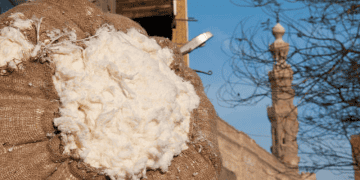Sourcery has unveiled the findings from its Impact and Assurance Programme, aimed at increasing transparency and traceability in the cotton supply chain, particularly within the fashion industry. The initiative, described as pioneering, has emphasized the necessity for accurate, comprehensive, and equitable data collection to meet the rigorous standards of transparency required by the apparel sector. Over the course of a three-year development period, which culminated in its recent commercial release, the programme highlighted several challenges in the sector, including the precision of grower identification and their geographic details. Conducted in regions such as Maharashtra, Madhya Pradesh, Gujarat, Rajasthan in India, and Punjab in Pakistan, the study uncovered substantial inaccuracies in existing grower data, particularly the geocodes used for identifying participants in various initiatives.
The use of Polygon mapping within Sourcery’s advanced digital farm mapping system has been identified as a more reliable method for capturing exact farm locations, enhancing the quality of data obtained. This approach is touted as a critical asset that the industry currently lacks, which is essential for ensuring the validity of the supply chain data from the farm to the market. Furthermore, the findings suggest that initial investments and training are crucial for effectively engaging with growers, field teams, and other stakeholders like aggregators and gin operators, to ensure the adoption of accurate digital mapping techniques. Sourcery anticipates that its upcoming Connect App will simplify and scale up these processes, facilitating better support for farmers and ensuring that those using the app are appropriately recognized and compensated for their efforts.
Ruchita Chhabra, Sourcery’s Grower Engagement Director, emphasized the importance of moving beyond traditional GPS data to adopt digital polygon mapping, enhancing visibility across the supply chain. “It’s not just about technology; it’s about building trust and creating a system that benefits all parties involved,” Chhabra noted. She also highlighted that the programme’s early findings are just the beginning, with ongoing training aimed at empowering growers to independently share data in the future, fostering a collaborative environment where accurate information benefits both growers and manufacturers financially.
The programme has identified several key learnings, including the effectiveness of incentive-driven data sharing, the need for substantial investment in grower engagement, and the importance of adapting data collection methods to the local realities of farmers. These insights are geared towards fostering transparency, inclusion, and trust among all stakeholders from growers to retailers. Sourcery is extending an invitation to all cotton growers and organizations across India, Pakistan, and globally to engage with the programme. It is currently offering a free assessment of existing farm data and complimentary access to the Sourcery Connect App for a limited period to ensure comprehensive connectivity and recognition of growers’ contributions to the agriculture and textile industries. The app is set to be launched in the market this autumn, aiming to inform and increase adoption among growers.
Stay informed with supply chain news on The Supply Chain Report. Free tools for international trade are at ADAMftd.com.
#CottonTransparencyNews #SustainableFashion #TraceableCotton #FashionSupplyChainNews #EthicalSourcingNews















